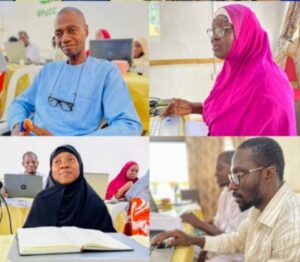

By Correspondent.

The Democratization of Environmental Literacy in Post-Primary Educational Institutions in Nigeria (DELiTE) project, domiciled at Summit University, Offa, Kwara State, recently held a transformative workshop to pioneer the development of a 21st-century curriculum designed to advance environmental literacy. The event brought together leading education experts, environmental advocates, and policymakers to reimagine educational strategies for Nigerian post-primary schools in addressing pressing environmental challenges.
In a compelling keynote address, Professor Hamdallat Yusuf of the University of Ilorin highlighted the critical components of effective curriculum design. She underscored the importance of integrating innovative methodologies that foster critical thinking and problem-solving skills among learners. Professor Yusuf provided valuable insights into the structure of existing curricula while emphasizing the need for a shift towards experiential and problem-based learning tailored to real-world challenges.
Professor Yusuf also introduced a culturally sensitive and open-access curriculum model, advocating for its adoption to equip students with the tools needed to address environmental issues such as pollution control, clean energy generation, and climate change adaptation. Her presentation included a robust five-stage curriculum development framework to serve as the foundation for these transformative initiatives.
The Principal Investigator of the DELiTE project, Professor Abiodun Musa Aibinu, who also serves as the Vice-Chancellor of Summit University, elaborated on the essential attributes of the proposed curriculum. He outlined a comprehensive evaluation strategy that prioritizes cultural sensitivity, experiential learning, and measurable outcomes. Professor Aibinu emphasized that the curriculum’s impact would be assessed through pre- and post-evaluations of students’ environmental literacy and community feedback to ensure relevance and effectiveness.
This landmark workshop has set a new direction for environmental education in Nigeria by prioritizing inclusivity, practical engagement, and cultural relevance. Participants left the event optimistic about the DELiTE project’s potential to foster a generation of environmentally conscious citizens capable of addressing global and local ecological challenges.
The DELiTE project forms part of the prestigious 2024 Global E-STEM Awards from the North American Association for Environmental Education (NAAEE), USA. This recognition was awarded to a consortium led by Summit University, Offa, in partnership with OptiEdge Technology, the Institute of Innovative Technology, Ibadan, and the Federal University of Technology, Minna. Together, they aim to revolutionize environmental education in STEM and inspire impactful change across Nigeria and beyond.
The workshop also featured distinguished scholars and experts from diverse fields, including environmental and educational research, STEM, gender advocacy, renewable energy, carbon footprint analysis, agriculture, artificial intelligence, software engineering, mechatronics, and digital engineering. Among the notable attendees were Acting Dean, College of Natural and Applied Sciences, Dr. Maryam Bello-Akinosho; Acting Dean, Kola Balogun College of Artificial Intelligence and Digital Engineering, Dr. Ahmad A. Adeniran; Acting Coordinator, College of Innovation and Computing Technology, Mr. Usman Faruq; Coordinator, Research and Innovation Unit, Mrs. Mutiat Muhammed; Deputy Principal Investigator (AI4FS & DELiTE) and Coordinator, Innovation and Advanced System Research Group, Mrs. Ganiyat Kemi Afolabi Yusuf; Dr. Ayub Abdulgany; Dr. Odutayo Adesgun Olayide; Dr. Issa Nasiru; Principal Investigator, Open Access for Research and Development, Mrs. Nafisat Olajumoke Lawal; alongside other esteemed researchers, academics, and students.

